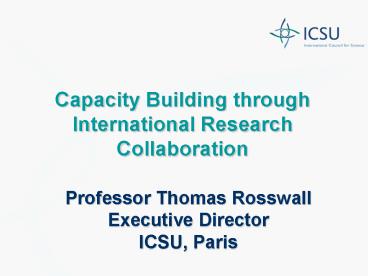Capacity Building through International Research Collaboration PowerPoint PPT Presentation
1 / 17
Title: Capacity Building through International Research Collaboration
1
Capacity Building through International Research
Collaboration
- Professor Thomas Rosswall
- Executive Director
- ICSU, Paris
2
The World Rising Inequities
- Inequities are rising within countries and
between countries - Assets of worlds 3 richest people exceed
combined GDP of poorest 48 countries - Worlds 15 richest people have assets that exceed
total GDP of Sub-Saharan Africa - I. Serageldin, IAC
3
The Knowledge Divide
- OECD countries spend more on RD than economic
output of the 61 poorest nations - High income countries earn 42 time that of low
income countries but spend 218 times more on
research - IBM was granted 2756 patents in the US (1999),
while 134 countries together were granted 2643 - World Bank ST Strategy
4
Status of Science in Africa
- Public budget cuts
- Higher education and research systems in decline
- National coordination bodies dissolved or with no
political influence - Nearly no recruitment during the 1990s
- Poor salaries staff often go unpaid
- Brain drain
- J. Gaillard, IFS and IRD, Johannesburg 2002
5
Bending the Curves
The Gap
2003
Time
6
Bending the Curves
- Support of individuals
- Support of institutions
- Support of national science policies
- Change of attitudes
7
Support of Individuals - Recurring Difficulties
- Equipment repairs
- Purchasing equipment
- Access to equipment
- Access to scientific documentation
- Access to vehicle
- Access to supplies
- Lack of technicians
- Data processing
- Field work difficulties
- Lack of time
-
IFS MESIA Report 2 (2001)
8
Action
- Expand small comptetitive grant schemes to young
scientists (IFS-TWAS model) - Training courses for repair and mentainenace of
equipment (e.g.,IFS, TWAS) - Strengthen efforts to provide scientific
literature (e.g., INASP) - Training courses in writing grant applications
and scientific papers (e.g., IFS) - Networking S-S and N-S through collaboration in
international coordinated research
9
Coordinated Research
- The four global
- change programmes,
- especially IGBP and WCRP,
- provide the framework for the science
- on which IPCC assessments are built.
10
Earth System Science Partnership
- an integrated study of the Earth System,
- the changes occurring to the System, and
- the implications for global sustainability.
11
Bellagio Report, 1990
START Mission
- To conduct research through regional networks of
collaborating scientists and institutions - To enhance scientific capacity in developing
countries - To mobilize the resources for activities in
developing countries
12
Portfolio of START Activities
- Capacity Building
- Regional Research
- Cross-cutting, Integrative activities
13
Capacity Building Activities
- Types of START Capacity Building
Programs To-date - Regional Science Planning and Research
Workshops 75 - Collaborative Research Networks 50
- Short Term Fellowships 175
- Visiting Scientists and Lecturers 121
- Dissertation/PhD fellowships 25
- Small Grants Program 100
- Young Scientists Awards 163
- Advanced Institutes 30
- Training Institutes/Courses 150
- 1500 scholars from developing countries
involved in START - activities in 2003-2004
- 150 young scientists currently conducting
research under START support
14
Monsoon Asia Integrated Regional Studies
Sustainable development of the region
Natural Forcing
Tibet
Solar Radiation
Land/ Ocean
15
Assessments of Impacts Adaptation to Climate
Change (AIACC)
- Objectives
- Build capacity in developing countries for
research in support of climate change adaptation - Advance scientific understanding of climate
change impacts, adaptations and vulnerabilities - Link the research community with the policy
community to support national communications and
adaptation planning
16
No size fits all
- The regions are different
- The countries are different
- Inequalities within countries (top 100 US
Universities account for 80 of federal RD
funding the remaining 2350 for 20) - All the capacity building components are
essential They reinforce each other - The whole is more than the sum of the parts
17
We have identified the problems. There are
solutions
Make it Happen!

